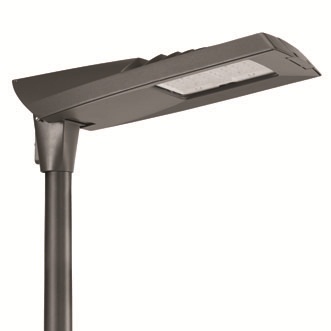
Mini Luma LED street light from Philips
Warrington Borough Council is replacing two thirds of the 27,000 street lights across the borough.
The council is investing £25 million to upgrade its street lighting columns and lanterns. Approximately 18,000 street lights will be changed over a three-year period. The move is expected to reduce light pollution, energy consuption and carbon dioxide emissions.
A combination of white fluorescent PL and Mini Luma LED lanterns from Philips will replace the existing SOX lamps. "White light has been shown to make objects appear clearer and faces more recognisable," the council said, "even if lighting levels are lower. This is especially important for the elderly and those with poor eyesight."
The new scheme will also come equipped with a central management system from Philips, to allow the council to control the lighting.
The council has already changed thousands of street lights during a previous Invest to Save scheme through Salix. A project which also incorporated dimming into hundreds of lanterns.
Street lighting in Warrington currently costs the council £1.4 million a year in energy bills and counts as 17 per cent of the authority's total carbon dioxide emissions. Over 60 per cent of the current street lighting stock has been in place for 25 years or longer.
In nearby Liverpool, the city council is switching all of its existing street lights for LED alternatives in a bid to brighten its streets and reduce carbon dioxide emissions and energy costs. The £7 million project will be completed in phases over the next two years. The first phase began this month, and will see 12,000 SOX street lights swapped for LED.
"We have decided to bring LED street lighting to Liverpool to improve the lighting across the city and make our streets safer," said Mayor Joe Anderson. "This will help to make our city greener and a better place to live by saving over 1,400 tonnes of carbon [dioxide] emissions each year."
Maintenance costs are expected to be reduced by £2.7 million overall over the next five years after all the street lights have been converted. "We can then reinvest this saving into other key services for the benefit of our local communities and the prosperity of Liverpool," he added.
The council is working with Amey to roll out the new lighting. The oldest street lights have been identified, and the programme begins with the replacement of 1,038 streetlights across Fazakerley over a four-week period.
The council currently spends around £2.6 million a year on energy costs resulting from running its 57,000 street lights and illuminated signs and bollards across the city.





